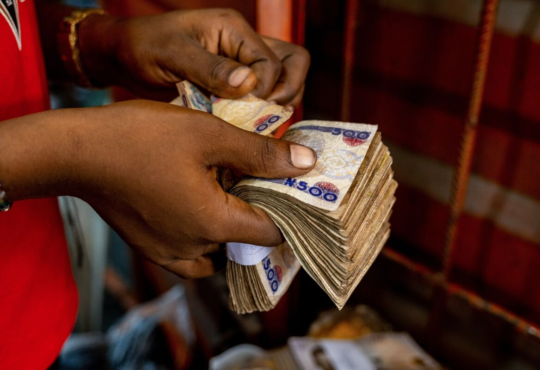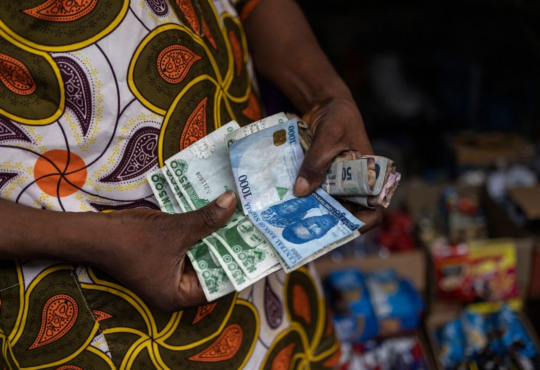
Nigeria’s recent cash shortages exposed the vulnerability of the country’s alternative payment systems and has led to renewed momentum toward a cashless economy. In a country still dominated by cash, the dearth of new banknotes after the changeover to a redesigned currency caused significant hardship for Nigerian citizens, who were unable to access their savings.1
It also resulted in a contraction in the private sector for the first time in almost three years.2 Small and medium-size enterprises (SMEs), which account for more than 90 percent of businesses and are responsible for 80 to 90 percent of all customer-to-business (C2B) payments in Nigeria, were disproportionately affected.3 Thus to move toward a cashless economy, an increase in the number of SMEs that can safely and reliably accept digital payments from customers will be critical.
As part of our work in this space, we have spoken to both merchants and merchant acquirers to uncover what may be needed to accelerate the transition to digital. It is clear that while the culture of cash may be eroding, significant obstacles remain in the path toward digitalization. For instance, point-of-sale (POS) penetration in Nigeria is significantly below that of comparable African economies.4 And since alternative payment acceptance is still in its early days and merchant literacy levels are low, onboarding new merchants can be challenging and costly, requiring multiple touchpoints.
Moreover, unreliable and unstable infrastructure can result in failed transactions and unreliable customer data, further eroding trust in the system, as well as increasing operational costs. The economics of merchant acquiring are already tight, with margins among the lowest in Africa.
Despite these challenges, the outlook for merchant acquiring in Nigeria is optimistic, with several trends working in its favor: digital penetration and usage in the country is on the rise; the fintech industry is evolving quickly to cater to the demands of a young and digitally savvy population; and financial and government institutions are collaborating to create a conducive environment that fosters financial inclusion.
Our analysis suggests that merchant acquirers looking to take advantage of these tailwinds and make headway in this challenging market can consider focusing on four key fundamentals.
First, in a fast-evolving and competitive market, merchant acquirers may need to take a customer-centric approach and create distinctive offerings that meet unique pain points within specific customer segments. Second, by investing in building direct relationships with merchants, merchant acquirers could scale up recruitment efforts and maximize retention. Third, guaranteeing the reliability of their service may be key to the growth of merchant acquirers going forward, whether that involves multiple integrations to processors or directly integrating with banks. And finally, the introduction of value-added services such as lending and invoicing will likely become a key source of differentiation and growth.
Essentially, companies that act now to leverage technology and relationships to offer SMEs hungry for digitalization more reliable and cost-effective payment solutions could attain a position of strength.
Electronic payments are a large and fast-growing market in Nigeria. As of 2021, the sector generated an estimated $2.1 billion in revenue and $1.1 trillion in value, approximately 60 percent of which is accounted for by domestic payments, which amount to $1.2 billion in revenue.5 Significant growth in this space is expected over the next few years, with domestic payments revenue projected to grow by about 34 percent per annum by 2026, equating to $5 billion in total.6
As of 2021, the domestic C2B market accounted for around $450 million in revenue, with merchant acquiring being the most attractive part of this value chain.7 Of this, C2B merchant payments accounted for $320 million in revenue.8 Combined, the acquiring bank, the terminal provider, and the payment terminal service provider (PTSP) captured around 65 percent in revenue, and total merchant acquiring revenue is estimated at about $200 million.9 By 2026, this revenue is expected to grow to around $900 million, driven primarily by card transactions (exhibit).
Offline acquiring, where a POS terminal is installed at the point of sale, accounts for around 90 percent of the revenues and 95 percent of transaction value and is projected to continue to comprise the largest proportion of revenues and value in 2026.10
A convergence of several trends is shaping the opportunity for the growth of merchant acquiring in Nigeria.
First, as digital penetration grows—spurred in part by the COVID-19 pandemic—electronic-payment methods are also growing. Nigeria has more than 170 million mobile phones, and internet penetration has been increasing; between 2005 and 2020, internet users increased from 3.5 percent of the population to 55.4 percent.11 Furthermore, the number of POS terminals in the country grew significantly from around 155,000 in 2017 to just over one million as of April 2022, with approximately 1.8 million POS banking agents.12
Second, local fintechs are innovating rapidly, forging partnerships and attracting international investment to enable Nigerian SMEs to participate in the digital global economy. For example, African payments giant, OPay, recently partnered with Mastercard to enable OPay’s merchants and customers to connect to global businesses through the OPay wallet.13
Nigeria’s fast-growing, youthful, and rapidly urbanizing population and a renewed push toward financial inclusion by the Nigerian government are also creating favorable conditions for the development of the sector. The Central Bank of Nigeria (CBN) has been driving the effort to reduce the country’s dependence on cash with several initiatives aimed at promoting digital payments, including by introducing the POS and agent banking system in 2013.14 More recently, the CBN has launched a domestic card scheme to rival foreign cards, and it also launched Africa’s first digital currency, the eNaira, in October 2021.15
And finally, the recent cash shortage in Nigeria has further hastened the adoption of cashless payments and merchant acquiring, generating strong organic demand for digital-payment solutions by merchants of varying sizes and scale. A merchant acquirer we interviewed said that they now have more demand than they can accommodate, and that 70 percent of their new customers have never previously collected digital payments.
Traditionally, merchant acquiring in Nigeria has been led by banks that issued card-based POS systems to large corporates and was profitable only to those with scale. But the market is ripe for expansion. Traditional channels catered to only one form of payment—cards—but at just 0.6 per 100 adults, Nigeria has one of the lowest card penetrations in the world. These channels have also largely excluded SMEs.
While SMEs may be harder to acquire, they represent a significant opportunity for merchant acquirers in terms of both volume and value of transactions. Digital innovators that can offer SMEs hungry for digitization more reliable and cost-effective payment solutions are gaining an advantage and changing the face of merchant acquiring.
Many of today’s successful merchant acquirers started off with agency banking operations. This allowed them to build a large base of agents in proximity to small and medium-size merchants to facilitate cash-in and cash-out operations with POS systems. However, depositing cash with agents comes at a cost to merchants, and some players interviewed estimate that the proportion of these transactions has decreased from 90 percent to 70 percent within the past 18 months. As the cost of handling cash prevails and margins in agency banking continue to compress, experts estimate that the proportion of cash-in and cash-out transactions may tilt even further toward payment acceptance, especially as merchant acquirers equip their agents to accept payments and expand their offerings to other merchants.
The same evolution is seen in other markets. In Egypt, for instance, agency networks such as Fawry laid the foundation for agency banking, with more than 250,000 agents offering a range of services, including cash-in and cash-out, utility, airtime, and other bill payments. In recent years, Fawry has pivoted to merchant acquiring by converting its agent base to accept payments, while also equipping merchants outside of its networks to do the same. In the past year, more than 14 percent of Fawry’s revenues were derived from merchant payments.16
As merchant acquiring has grown, technology has also evolved and payment methods have proliferated. SMEs now have access to a range of technology, from traditional POS to low-cost omnichannel payment solutions, such as soft POS, which allows merchants to accept card payments directly on their phones or devices without the need for additional software, and mobile point of sale (mPOS), which equips merchants with portable wireless payment terminals. In addition, POS systems are themselves evolving from card-based to omnichannel solutions that can also accept transfers, QR code payments, and digital-wallet transactions, including the use of new quick response (NQR) for secure and efficient digital payments. It is unclear whether digital currencies, such as the eNaira, will accelerate the need for merchants to accept these payment forms across multiple channels.
As the merchant acquiring market expands, competitors are increasingly able to meet merchants’ foundational needs for speed, security, reliability, convenience, and flexibility. And as the market’s evolution continues, players will be expected to improve their ability to meet more advanced merchant needs, offering value-added services like instant settlement, access to capital, reconciliation and reports, and other business support. We surveyed approximately 160 Nigerian merchants, and the majority cite payment reconciliation across their different product segments, payment portfolios, and footprint as one of their most pressing needs. They also often express a desire for integrated offerings.
Value-added or enhanced service offerings are expected to become more relevant as merchants’ needs evolve and payment margins are further squeezed. Globally, merchant acquirers have already made this shift: Stripe, an Irish American financial-services and software-as-a-service company, offers value-added services that now generate about three times its payment revenues; and in Nigeria, merchant acquirers like Traction, OPay, and Moniepoint are already starting to offer value-added services such as lending, invoicing, reconciliation, and other business tools needed to formalize merchants’ operations.
At present, most of Nigeria’s merchant acquiring solutions are homogenous, with little differentiation by sector. Globally, however, the development of customizable tools to meet the needs of specific sectors, such as schools, hospitals, and formal retailers, has taken off. For instance, Toast, a United States-based merchant acquirer, developed business tools and payment solutions designed to cater to the restaurant industry. As the Nigerian merchant acquiring segment grows, it is unclear if it will follow suit. Operators we spoke to shared mixed views on whether the development of segment-specific solutions will be relevant in Nigeria. While some agree that this is indeed where the market is heading, others are doubtful that there is sufficient scale within specific sectors to make this level of customization practical.
While the potential for future growth is significant, merchant acquirers operating in Nigeria may need to navigate a number of barriers that could impact profitability and scale along the value chain.
The fragmentation of the Nigerian SME market may make recruiting, onboarding, and servicing merchants more resource intensive. A “boots on the ground” approach could therefore be required when recruiting merchants through sales agent networks or third-party contractors. This comes at a significant cost, however; according to some players we interviewed, onboarding can cost between $5 and $50, depending on the type of sales agents used.
The onboarding process itself also offers friction points. For instance, identity verification systems with less sophisticated technological architecture may be unreliable and unstable, resulting in frequent downtime. As a result, players may have to use multiple verification methods, which can extend the time it takes to be onboarded. Furthermore, SMEs require a relatively “high touch” service model, and building a team to service the growing needs of merchants may be costly.
Technology issues may have further consequences, impacting the reliability of payment acceptance (the percentage of payments that are successful out of those that are attempted). Clearly, a payment system must work as it is meant to and when it is meant to, yet the most persistent challenge acquirers face is being able to guarantee payment reliability. Experts we interviewed hinted at serious infrastructure gaps in the payment system sophistication, capacity, and capabilities, exacerbated by Nigeria’s engineering “brain drain.” Furthermore, the nature of the value chain in Nigeria—which can involve up to six players in one transaction—means there are multiple nodes for failure in a single transaction. By comparison, in many other markets, direct integration with the issuing bank reduces the opportunity for failures in the process.
To address these challenges, merchant acquirers often have multiple integrations enabling a more dynamic management of downtime. Some merchant acquirers are also integrating backward, building their own processing infrastructure in order to guarantee the reliability of payments.
Further down the value chain, value-added services also pose challenges for the growth of merchant acquiring. While merchant acquirers agree that value-added services—including offering alternative payment methods, dynamic currency conversion, faster payment settlement, and funding—are important, the challenge has been how to monetize these. With regard to loans, operators interviewed mentioned that designing repayment and collection plans aligned to the cashflow patterns of the merchant is one way they have succeeded in scaling their lending solutions to merchants. However, beyond loans, merchants report that they are hesitant to pay for value-added services, as many are offered for free.
Many merchant acquirers also grapple with the decision of whether to build value-added services in-house or offer them to customers through partnerships with domain specialists. While in-house development may be constrained by limited in-house engineering capabilities, the ability to structure commercially and operationally viable partnership agreements can also stand in the way of service delivery through partnerships.
Building a competitive business in the complex environment that is Nigeria is likely to demand significant investment and local knowledge. In looking to craft a recipe for success, merchant acquirers could consider focusing on getting the following four things right:
Long overlooked as a largely offline component of payment processing, merchant acquiring has become the new playing field in payments. Globally, players are now competing to differentiate their offering, adding enhanced services to existing customers and creating new value in the SME market. Despite the challenges, in Nigeria there are significant opportunities for merchant acquirers to join this drive and dethrone cash as the primary payment method, particularly for companies that can offer innovative and affordable solutions that cater to the needs of SMEs.
By leveraging technology and collaborating with stakeholders across the payment ecosystem, merchant acquiring companies could make significant inroads into this potentially valuable segment. At the same time, by providing SMEs with better payment services, merchant acquirers also have a key role to play in driving financial inclusion and supporting the Nigerian economy. Most importantly, they can help to ensure that a lack of cash need never again be the reason that Nigerians experience hardship.
Mayowa Kuyoro and Frederick Twum are partners and Tola Sunmonu-Balogun is an associate partner in McKinsey’s Lagos office.
The authors wish to thank Blessing Omene and Christina Seyfried for their contributions to this article, as well as the following organizations that participated in interviews for this research: Moniepoint, OPay, and Traction.






